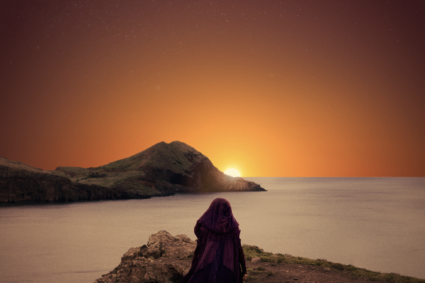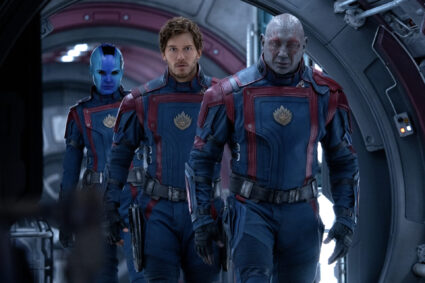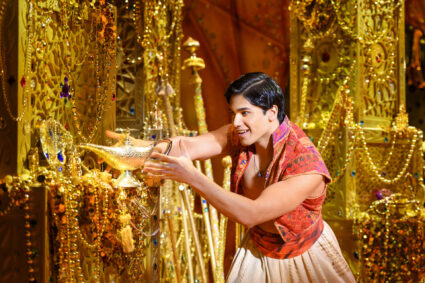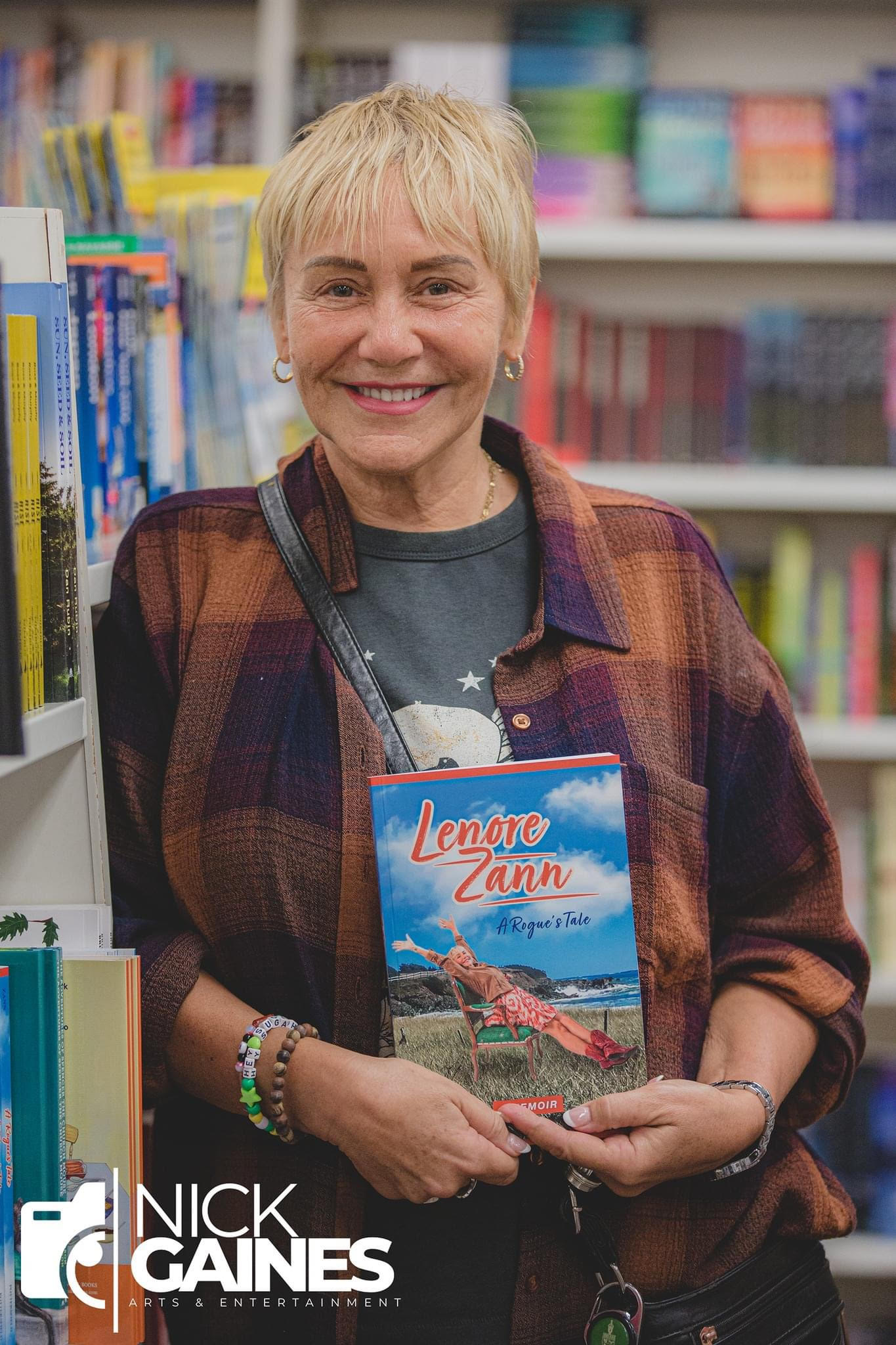
On this latest edition of SNAPSHOTS, imagine if you will, you’re at home in 1992 watching your favorite Saturday morning cartoons, and you happen to tune into Fox Kids, and you’re seeing X-Men: The Animated Series in all their animated glory. Our guest is part of that phenomenon. In her memoir, A Rogue’s Tale: A Memoir, she takes readers on a rare behind-the-scenes look at her experiences voicing one of the most iconic characters of the 1990s and she has some encounters with some Hollywood legends, like Spielberg & Keanu Reeves. Her latest project, X-Men ‘97 which airs on Disney+, has gone on to earn so many accolades. To purchase the book, click HERE
My friends and fellow mutants, I have the honor of talking to the one and only, Rogue aka Lenore Zann!
Lenore, welcome to Snapshots!
Well, hey there, suga. It’s a pleasure to be here!
To hear that “suga” just brought back a lot of childhood memories. First off, I cannot believe we missed each other at a convention down here in my area, Fairfax Comic Con. But I’m talking to you, that’s the most important thing.
It’s great to be here, and it was great to get to Fairfax as well. It’s been nice to get all around the United States and meet fans from right from one coast to the other. It’s been an amazing journey.
Was this your first time in the DC metropolitan area?
You know, it actually was. I’d love to come back and do some like historic touring, so that I can go to some of the iconic places, even like to the White House and stuff like that. Love to see where George Washington lived and learn more about the early days. I’m fascinated with American history. My mom taught history, so I’ve always been a history buff, but I’d love to get down there, especially in the spring, when all the cherry blossoms are out. I’d love to come then
As a lifelong Washingtonian, I can tell you, that you must come down for the cherry blossoms. The Cherry Blossom Festival is an amazing experience. I just did my very first visit to the White House a week ago.
Oh, really, wow. And I can you go inside and everything? Are there tours?
Yes, you can go outside and visit see some of the different rooms in the White House, especially the room that really fascinated me was the room where, not only that President Johnson signed the Civil Rights Act of 1964 but Lin-Manuel Miranda performed Hamilton.
I wish I could have seen that.
I would be remiss by saying congratulations to X-Men ‘97 for being awarded Best Animated Series or TV Movie at the most recent Astra TV Awards. You were nominated for Best Voice Over performance, but you were the one who got to accept the award on behalf of your crew. How did it feel to get that accolade recently?
Well, it was pretty exciting for all of us. You know, those of us who are in the original show, the OG cast, who started doing this 30 years ago and believed in the show then and then went away and had lived in between then and now in the acting profession, and I also went into politics, to come back from all of that and then be winning all these awards for our new work as X-Men’ 97 cast members. It’s like a dream come true. We’re all very excited, and we’re all very, very grateful. We’re grateful that Marvel and Disney thought to bring us back, and that the fans have been so loyal to us and to the show over the years, which is why the show is back in the first place.
Yes, and the hits keep on coming.
While I have you here, I will grab the award and show it to you. (Lenore goes off to grab the award itself) I have it with me here in Toronto, because I brought it with me to show on one of the interviews that I’ve done this week from my book, but it’s a beautiful award. They’re called the Astras, and it’s the Hollywood Creative Alliance who give these awards out. It was one of the most beautiful award ceremonies I’ve ever attended, and they even had puppies on the red carpet for adoption. And I believe I’m going to be adopting a little puppy.
Now do you have a name for the puppy yet?
Of course, I do, and he’s a little boy. So, I’m gonna call him Remy Labeau, my little Remy. I’ll have to show him from time to time when I come on interviews. From now on, he’s very cute.
The Critic Choice Awards just nominated the show for Best Animated Series. Entertainment Weekly named one of the episodes one of the 20 best episodes of 2024 and it’s one of my favorite episodes of the entire season, Remember It. I read in your Instagram that you were “given a script that enabled you to express your depth of emotions as an actor and as a human being in this world full of sorrow, heartache, loss and pain.” Now for those who have not seen this masterpiece, tell us about this particular episode that has made the top of the accolades for 2024.
Well, thank you for that. And yes, that was part of the speech that I wrote. I was given about ten minutes before I knew that we were going to be getting up on stage and winning that award. So, I scribbled this speech on my little phone with my thumb. But I felt like I needed to address the fact that there has been so much suffering and sadness and grief out there in the world because so many people are losing people that they love throughout the pandemic. For instance, now in wars, in terrible mass shootings, things like this.
When I got a script, the script for Remember It, which is about the loss of two loved ones of Rogue, my character, it’s overpowering and the grief of being in a war zone and in a place where she witnesses everybody get wiped out, including her loved ones. It’s overwhelming, and I had just lost my own sweet, dear little niece, Maya, who was 17, and she battled cancer for a few years. And she battled it valiantly, and in the end, it took her young life, and it was devastating for myself, my sister, of course, her mom, our parents, her brothers and her husband, and we just were in such deep grief.
And when I got the script to Remember It and I read it, I thought, here’s a place to place my grief. I can use the grief that I’m feeling, my authentic grief and pour it into my work, into my performance as an actor, so that other people can feel it. They can hear it in my voice, and it will hopefully reverberate within them, so that if they’ve lost anyone, and they know maybe they’re deeply grieving and they’re not even aware of it, that it might loosen that up and make them feel their feelings, and have them released in like a cathartic way, and then hopefully get some healing.
And I was really pleased to see that the reaction to that episode was exactly that people just were saying. I mean, it broke the internet, people were saying, you broke me. You know your last words, “Suga, I can’t feel you” broke me. And I say, Well, that’s good. It’s good to feel your feelings. And that was the episode we also got nominated for an Emmy Award for we didn’t win, unfortunately. I feel really grateful and blessed that I was given that opportunity and hopefully made other people feel their own feelings and maybe get some healing as well.
Well, I can tell you, from personal experience, it touched me, even after losing both my parents for over 30 years now, and that episode some comfort to me personally. So, thank you to the writers, to the acting talents of you and the cast, and I’m so glad that Entertainment Weekly among the Emmys recognize this pure, brilliant masterpiece.
We appreciate it very much, thank you.
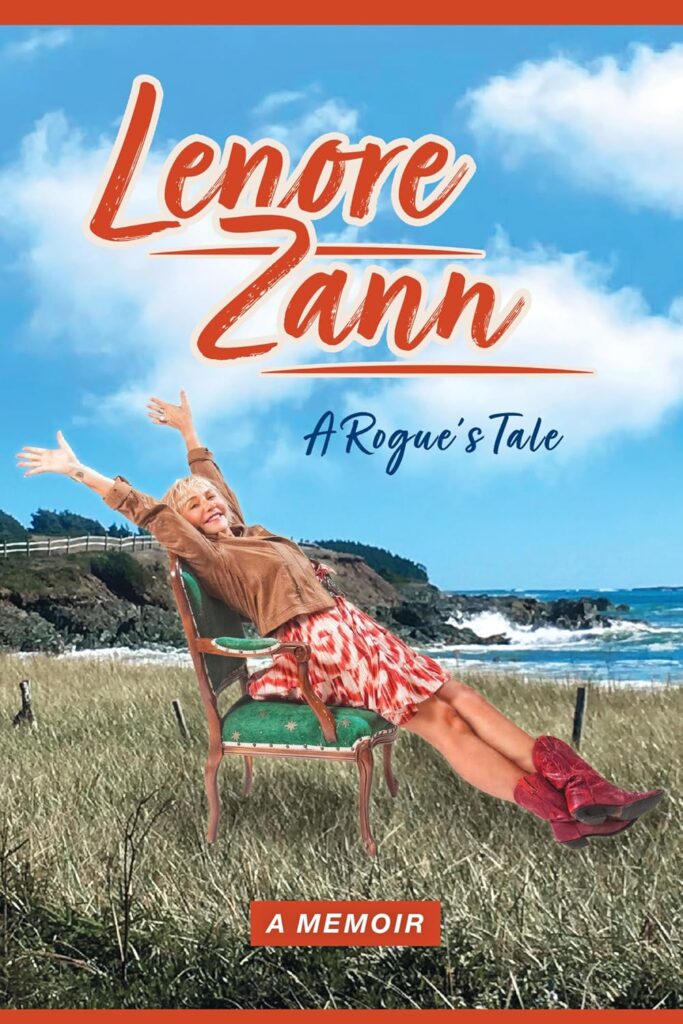
I read your memoir maybe two times so far. Wow. And I love the adventures. I love the chapters about acting. One of the captions that I remember from the book is you mentioned that “Rogue is a hero with an Achilles heel, a unique that could prove deadly. However, in her case, her greatest strength is also her Achilles heel”. Tell us what you mean about that quote.
Well, thank you for that great question. I often liken the X-Men and these superhero characters to our modern-day, mythological heroes. So as a child, I was fascinated with Greek mythology, with Roman mythology. As it turned out, from all around the world, many of the world’s cultures have similar stories, but just with different names of the heroes and the different mythological heroes, have different strengths and properties, like our superheroes of today.
Also, in Greek tragedy, they talk about these tragic heroes having a fatal flaw, which they call their Achilles’ heel. And they call that because Achilles, although he was super strong and everything and great in battle, got shot by an arrow in his Achilles, what we would now call the Achilles’ heel, and it killed him. And so that’s why, to this day it’s called the Achilles’ heel, so robes and so that is somebody’s fatal flaw, their weakness, their vulnerability.
So, Rogue, I say her greatest strength is also her Achilles’ heel because her greatest strength is that, obviously, she can fly. That’s fine. She’s got super strength. She can pick up buildings and throw them. Okay, she but she can touch somebody’s skin to drain them of all their life force, and take it upon herself and get stronger and take upon her all their superpowers and properties. But that makes her stronger, but it’s also her greatest weakness and vulnerability because it means she can never be in love. She can never be intimate with somebody. She can never let her guard down, because she’s afraid that if she does and if she falls for it, and if she lets Remy kiss her too long, and if she does that, she will kill the person or people that she loves, and so she always has to have this armor up where she stays strong and kind of silent on her own, like don’t touch me right, as opposed to getting out there and being able to just live her life like everybody else. And that’s why I call it her greatest strength is also her Achilles’ heel.
You’re absolutely right now that you put in that perspective. I kept reading and found that your starting point in your career was playing an iconic actress, Marilyn Monroe, and now you played her three times. In fact, in the early part of this century, you developed a play called The Marilyn Tapes. How did your experience portraying Marilyn Monroe help you connect with fans and characters on a deeper level?
Thank you. When I first played Marilyn, I was discovered by the composer, writer of the show called Hey, Marilyn. He had just completed writing a rock opera on the life of Marilyn Monroe, and they’d been searching for about a year for the right actress to play the role. They’d searched in Hollywood and New York. They searched from one end of North America to the other. And then he came to see a concert in Charlottetown, Prince Edward Island, which is where Anne of Green Gables is from. And that summer, had been hired as a young 20-year-old to understudy Anne in Anne of Green Gables the Musical.
And I had never gotten to go on to play Anne that summer, but at the end of the summer, they had a big concert, and they said, “you’re allowed to perform something that will show what you can really do”. I did a Barbra Streisand song from the musical Funny Girl, and I did it as a Marlena Dietrich impersonation. This author happened to be in the audience that night, and he turned to his wife at the end of my performances, and they both said to each other, “that’s Marilyn”. And that was how I was cast.
At 20, I delved into the life of Marilyn Monroe. I read every book I could find on her. I quickly sussed out that she seemed to be two people. She was the Norma Jean Baker, the shy girl who really wanted love, who didn’t feel like she was really worthy of love, who was trying desperately to be liked and loved by people. And then the showgirl, Marilyn, which was the facade that she put on for the camera, and when men were she when she was trying to impress men. And my performance became that dichotomy, which is what made people really love the performance so much.
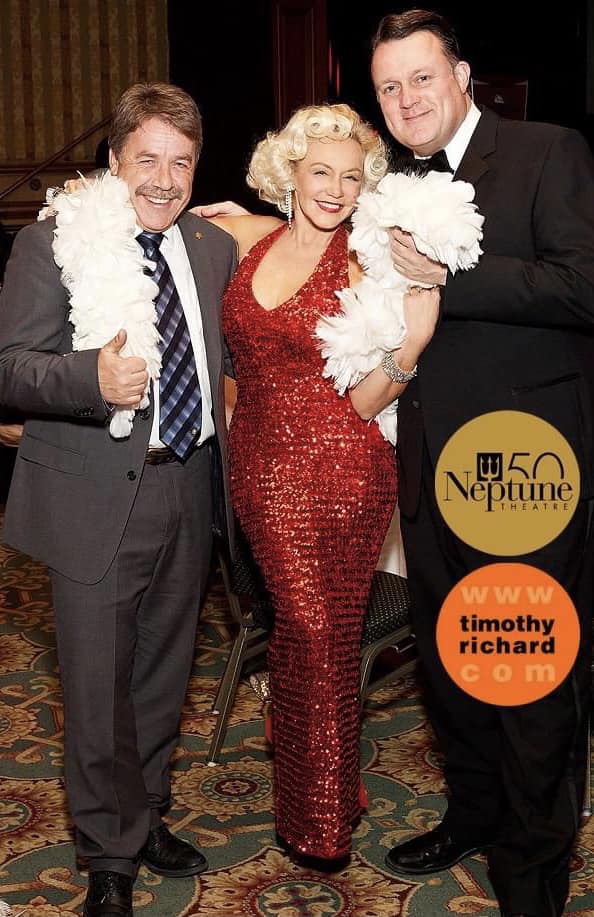
And like the critics all said, “A star is born” the day after the show opened. So that was the beginning of my love affair with Marilyn, and when I was in my later on, in my 20s, I was asked to play her again in another musical. And then at the end of my years of acting on the stage, at that time, in my 40s, I decided to write a play about her called The Marilyn Tapes. And I did it again with music, I sing as well. I did it at the Neptune Theater in Halifax, Nova Scotia, and then I took it to New York, and I did it for a year there.
And interestingly, there’s a lot about Marilyn that I can relate to. I was playing sex kitten roles. I was playing Marilyn Monroe at an early age and then kept getting passed in these kinds of femme fatale roles. But I was more than that, and I just didn’t seem to be able to break out of that stereotype, just like Marilyn, and that’s what my play was about. It was about being a female in 1950s trying to break out of the stereotypes that society has for you and also the stereotype that we have to look a certain way because so many women have body dysmorphia, and men too these days, where they have to feel that they have to be as skinny as a toothpick, but with have big breasts and, you know, big calf muscles.
You know, it’s sad that so many young people are resorting to getting surgery to try and look something like they think that they will be loved and accepted for, which is not going to last. It was great for me to be able to write about all this stuff and then perform it. And very healing as well. And then doing, that show in New York showed me that I loved doing my own work and getting my own political and socio-economic messages.
Then that led to me being asked to run for politics back in my home province of Nova Scotia. I suddenly realized, “oh, I can take the mask of a character off, and I can just be myself. I can speak as myself and get these messages about all the environment, diversity, inclusion and equality. I can do that as myself, not just as a character. I was an elected politician for 12 years in Nova Scotia and Canada as a member of parliament and member of the Legislative Assembly.
So, who would think that Marilyn Monroe would lead to that?
That’s a great transition to my next question because many people don’t know that you served as a member of parliament and a bill that you crafted, Bill C-226 had just finally passed in the Senate. Now for those who have not heard about this bill, tell us what it’s all about and your feelings that it has finally something you helped to create pass in the Senate?
Well, I became a member of the Legislative Assembly, which is basically the equivalent of a state Congresswoman, I was elected three times in a row. I was there for 10 years in the legislature in Halifax, Nova Scotia, and I introduced a private members bill called An Act to Address Environmental Racism. Environmental racism is the disproportionate number of toxic dumps, waste sites, landfills and corporate polluters that are placed on or beside racialized communities, and that would normally be black communities and indigenous communities, and that means that the people in those communities have worse health outcomes, because they’re dealing with like mercury in the water or whatever, whatever the toxicity is. I felt that it was really important to get this bill introduced and debated in Nova Scotia. It did not pass.
But then, after 10 years of being in provincial government. I ran federally for Prime Minister Trudeau, and won and became a member of parliament. And my very first day on Parliament Hill, I went to the parliamentary lawyers, and I said, “Please, here’s my bill that I introduced in Nova Scotia. Can you help me turn it into a strategy for the entire country of Canada, a national strategy on addressing environmental racism and environmental justice”? And we did, and I introduced it, and it just passed this past summer. It became law. We got royal assent. It’s now the law of the land. It took me 10 years to get from beginning to end, and now it’s law in Canada.
That is sensational. I’m so glad to hear that you’ve done great work for not only the community, but for Canada.
Appreciate that very much!
Now I want to go back to X-Men for a little bit. Growing up watching X-Men was really touching for me because of the subjects, for a cartoon series, was able to talk about back then. It touched on diversity & acceptance. How do you think some of these themes still remain relevant 30-plus years later?
First of all, I gotta say, my heart goes out to anybody who has experienced bigotry, racism, discrimination. I’m really sorry for any of the hurt, that you ever experienced as a young person growing up or even now. It’s not easy, and sadly, hatred is an age-old human thing, and it keeps being regurgitated and taught to new generations. Our show is the antithesis of that. We teach everybody that, “hey, it’s okay to be different, and isn’t it beautiful, and “hey, let’s all try to get along, and let’s work together to make the world a better place”. That’s why I went into politics, and that’s why Rogue fights for the underdog. She will fight. She will put her life on the line, not only for her friends but for those who cannot fight for themselves. She’ll be there. She is their hero, and she will fight to the death.
I love that about her. I think that in this day and age that we’re still dealing with the bigotry and racism that keeps raising its ugly head. Because the writers of the original show and the director, Larry Houston, who’s an African American, wonderful artist and writer himself, we always thought that by this time, the world would be different. People would have learned the lessons that we were trying to teach. The people I meet at comic cons who were kids in the 90s loved our show. They exude all of that warmth, love, fellowship, understanding, tolerance and acceptance.
I think if only the world has more X-Men fans in it, we can change the world. We can make it a much better place. I think let’s just keep doing the show. Let’s keep getting more and more people to watch it. It’s great to see parents turning their children onto it. Sometimes we have three generations of families coming up to us at comic cons who just love the show from six years old on up. So again, I’m sad that it still has to be a thing. But while it’s there, we are going to be there to try and teach people and educate people, and to also say to everyone feeling othered and feeling put down, hey, you know you’re you are loved, you are appreciated. Be yourself, don’t be ashamed.
Now let me take you back to that moment when you got the call to reprise Rogue after 20-plus years. What was your first reaction that they’re bringing back X-Men?
It’s funny. When I first I got an email first from a friend in the States, Mike Perez had put us together to do an X-Men reunion in Texas back in 2019. He said, “Hey, Lenore, you know, I know someone who knows someone in Disney is trying to find you. They want to talk to you about a new show or something.” And I was like, “yeah, right, tell me another one.” I mean, honestly, I thought it was a joke. I didn’t really believe it.
I was in Nova Scotia. I just finished my 12 years in government. And then I said, “Well?” He said, “No, no, I think it’s serious.” I said “Well, if it’s serious, give them my phone number”. And next thing I got a call from Meredith Lane, the casting director for Disney. And she was saying, “hey, Lenore. Listen, the producers are about to do a new show, and they’d like you to audition for it. Would you mind if I send you a script? Would you put down some lines and send it back to us?” And that’s how it started. When I got this the script and looked at the lines, I realized, “Oh, I know these lines. I’ve said these lines back 30 years ago.” I just, I went, “Okay, I guess they’re looking for Rogue.” So, I just did Rogue. I’d send it back, but this time on a cell phone by mp3, which didn’t exist. Well, Rogue has come into the 21st century.
Why does Rogue resonate with fans?
I think Rogue resonates for a number of different reasons. From what I’m told from fans, first of all, she is sexy. When I first auditioned for the role, my agent said, “Lenore, they’re looking for a woman with a deep husky sexy voice, who can do a southern accent”. And she said, “that’s you, so get on there, right?” I believe that there’s partly that, but also, she’s self-deprecating, she doesn’t take fools lightly. She’s a strong woman. She fights for the underdog. She’s the kind of woman you would want in your camp if you were at school. If you were being bullied, you want Rogue in your corner, because she wouldn’t take that. She would put them all in their place.
However, she also has this vulnerability, which is that she can never allow herself to be in love and to be intimate. And there’s a longing, a loneliness, a sadness deep underneath everything else. I think that also people relate to that. A lot of people in the LGBTQ community have told me that they relate to that because they grew up at a time when they when they felt like they can’t really express their feelings for another person, and they can’t go around showing their feelings and clustering the whole AIDS epidemic. People were afraid who could be to love one another in case they killed each other, similar stuff. I think she relates to many people for many different things, for many different reasons.
Read Lenore’s book “A Rogue’s Tale: A Memoir” on Amazon or wherever books are sold! To purchase the book from Amazon, click HERE
Get ready for Season 2 of X-Men ’97 when it comes back to Disney+
Follow Lenore on social media
